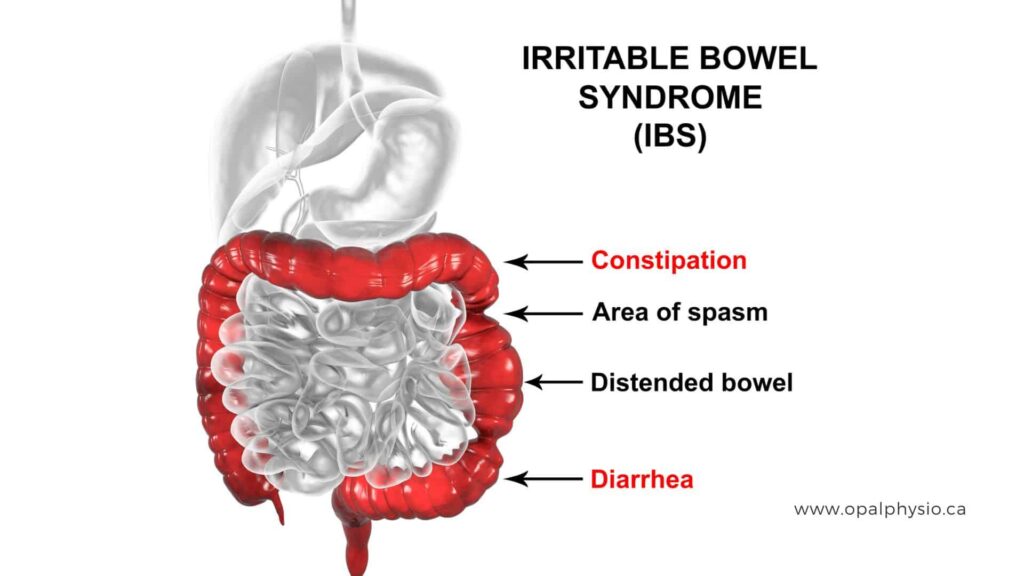Irritable Bowel Syndrome
Irritable Bowel Syndrome (IBS) Treatment In Langley
Do you or someone you know are affected by IBS? The most prevalent GI system ailment is irritable bowel syndrome (IBS).
At our clinic, we understand the impact that Irritable Bowel Syndrome (IBS) can have on your daily life. Our dedicated pelvic health physiotherapists are committed to helping you manage your IBS symptoms and improve your overall well-being. With a customized approach, we offer a range of services and treatments designed to meet your specific needs, empower you to take control and alleviate the symptoms of IBS.

What is Irritable Bowel Syndrome (IBS)?
Irritable Bowel Syndrome (IBS) is a common gastrointestinal disorder that affects many people worldwide. It is characterized by a range of uncomfortable symptoms, including chronic abdominal pain, bloating, and altered bowel habits, such as constipation, diarrhea, or both. IBS affects how stools travel through the small and large intestines functionally. These symptoms can make it difficult to carry out daily activities and significantly impact the individual’s quality of life.
The exact cause of IBS is still not fully understood, but it is believed to involve a combination of factors, including genetics, environmental triggers, and the gut-brain axis. Stress, anxiety, and certain foods may also exacerbate IBS symptoms.
Symptoms of IBS
The symptoms of IBS can vary from person to person, and individuals may experience different combinations of symptoms. Here are some common symptoms associated with IBS:
- Abdominal pain and cramping
- Altered bowel habits (constipation or diarrhea)
- Changes in stool consistency
- Bloating and gas
- Urgency and incomplete bowel movements
- Mucus in the stool
- Abdominal distension
- Fatigue and tiredness
It’s important to note that these symptoms can also be indicative of other gastrointestinal conditions, so it’s crucial to consult a healthcare professional for an accurate diagnosis and appropriate management of symptoms.

Causes of Irritable Bowel Syndrome
Irritable bowel syndrome has many potential causes, but its precise reason is unclear. Here are a few of the reasons:
- Consuming specific foods or beverages: Food sensitivities or intolerances like consuming dairy, gluten, legumes, and citrus fruits may cause IBS symptoms.
- Mental health conditions: although they may not always cause IBS symptoms, having stress, anxiety, or depression can often make them severe.
- Abnormal stomach muscle contractions: Cramping, bloating and diarrhea can be caused by the intestinal walls’ strong muscle contractions. But on the other hand, weak contractions might obstruct food passage and result in hard stools.
- Hormonal changes: IBS is more common in women. Signs and symptoms frequently worsen during hormonal changes, such as the menstrual cycle and hormonal imbalances, such as changes in estrogen or progesterone levels.
- Infections: The onset of IBS might be caused by viruses or bacteria and severe infection. Bacterial overgrowth in the small intestine can cause gas, bloating, and diarrhea.
- Genetic factors: IBS, tends to run in families
It is important to note that while these factors may contribute to developing IBS, the severity and frequency of symptoms can vary widely from person to person.

How can pelvic physiotherapy help manage Irritable Bowel Syndrome?
It is good to know that pelvic physiotherapy can help manage IBS symptoms. Combined with medical care and dietary modifications, physical therapy can effectively lower the IBS symptoms severity.
At our clinic, we believe in a holistic approach to Irritable Bowel Syndrome management. Our physiotherapy services aim to address the physical and emotional factors that contribute to IBS symptoms. Our treatment approach focuses on a combination including:
Getting Started with Irritable Bowel Syndrome(IBS) Physiotherapy Management
Our personalized approach to IBS management begins with a comprehensive assessment to understand your specific needs and goals. From there, we create a customized treatment plan tailored to your unique situation.
By providing specific stretching and pelvic floor muscles exercises, pelvic therapists at Opal Physio can help increase bowel function through various strategies. Treatment is beneficial for alleviating and preventing stomach bloating, abdominal pain, and constipation. We also try to manage the powerful bowel urges accompanying diarrhea using pelvic floor muscle training.
In addition, our staff are trained in visceral tissue mobilization, a physical technique that promotes proper colon function by mobilizing connective tissues in the internal organs. These treatments necessitate training beyond the typical physical therapy degree and have proven effective for managing IBS in many patients.
The therapists can also treat associated or coexisting illnesses such as fibromyalgia, TMJ disorder, persistent pelvic pain, and IBD. The therapy for these disorders can reduce stress and alleviate IBS symptoms.
You do not have to endure the discomfort and symptoms of irritable bowel syndrome. We are dedicated to helping you improve your quality of life by effectively managing your IBS symptoms. To book your initial consultation or learn more about our IBS management services, don’t hesitate to contact us.
